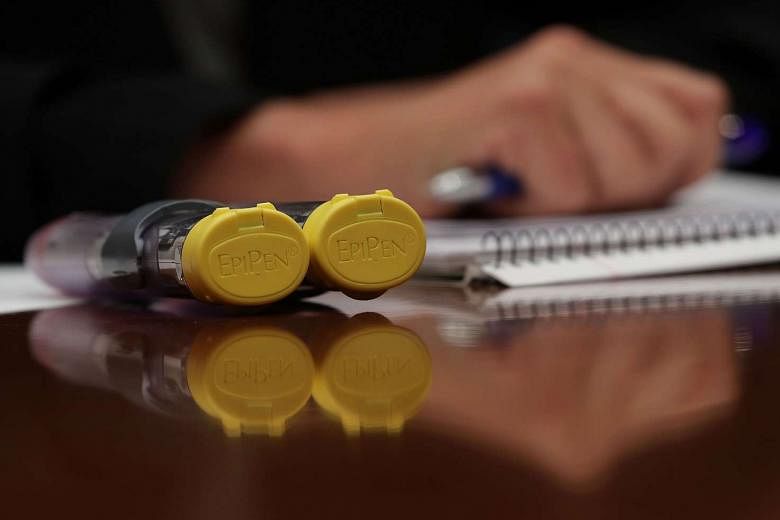WASHINGTON (BLOOMBERG) - Mylan's chief executive officer faced skeptical US lawmakers on Wednesday (Sept 21) as the House's Oversight Committee questioned her honesty, ethics and US$19-million (S$25.8-million) pay package during a hearing examining how the company hiked prices on its lifesaving anti-allergy EpiPens.
In several heated back-and-forths with CEO Heather Bresch, committee chairman Jason Chaffetz, a Utah Republican, accused Bresch and Mylan of downplaying its profits while at the same time paying its senior executives hundreds of millions of dollars.
Bresch and her company were accused of "disgusting" greed and of getting "filthy rich" by congressmen as she sought to defend the company's decision to hike the price of EpiPens by more than 500 per cent, to about US$600 for a two-pack from about US$50 for a single pen in 2007.
The oversight panel held a similar hearing in February with Martin Shkreli, former CEO of Turing Pharmaceuticals, known for hiking the price of Daraprim, a 63-year-old treatment for malaria and toxoplasmosis often used by HIV/AIDS patients, from US$13.50 to US$750 per pill.
Mr Chaffetz, holding up an EpiPen, told a packed hearing room in Washington that he found Mylan's arguments that it makes only about US$50 of profit on each device "a little hard to believe" when the cost of the medicine inside the pen, which he called the juice, was about US$1.
He was followed by Maryland Representative Elijah Cummings, the panel's top Democrat, who accused the drugmaker of taking advantage of the US health-care system.
Mylan raised EpiPen's price "to get filthy rich at the expense of our constituents", Mr Cummings said. Their strategy was to "find an old cheap drug that has virtually no competition and raise the price over and over and over again as high as you can".
Ms Bresch's compensation was an issue for lawmakers as well, as it often is when CEOs appear before lawmakers. When asked about her pay, Ms Bresch briefly stuttered before saying, "It's in the middle" compared to others in the industry.
She was awarded US$19.4 million in pay last year, which made her the 25th-best paid executive in the health-care industry, according to data compiled by Bloomberg. Her response generated more outrage from lawmakers.
"I am a very pro-business Republican, yet I am really sickened by what I've heard about this situation," said Representative John Duncan of Tennessee. "Nobody can really earn or deserve" that much money, he said.
Mr Cummings predicted that despite all the questioning, little would change.
"Today, we will hold yet another hearing where the industry will take these punches, but then go right ahead and keep raising their prices," he said. "They will fly back to their mansions in their private jets and laugh all the way to the bank while our constituents suffer, file for bankruptcy, and watch their children get sicker, and in some cases die."
Ms Bresch said she took the company's private jet from Pittsburgh to Washington for the hearing. The admission was in response to a question from Democratic Representative Bonnie Watson Coleman of New Jersey. She received more US$310,000 worth of rides on the company's aircraft last year, according to data on her pay and perks compiled by Bloomberg.
Ms Bresch, who is the daughter of Senator Joe Manchin, Democrat of West Virginia, made her case to lawmakers that Congress should recognise that Mylan has increased access to the drug.
She said in her prepared testimony that Mylan takes home only about US$100 after rebates, fees and discounts for each two-pack of the shots. Bresch said Mylan was not getting every dollar of the price increases.
"Recent EpiPen price increases have not yielded the revenue to Mylan that many people assume," she told the committee.
"Looking back, I wish we had better anticipated the magnitude and acceleration of the rising financial issues for a growing minority of patients" who had to pay the full list price or more, she said. "We never intended this."
"You never anticipated this? You raised the price, what did you think was going to happen?" Mr Chaffetz asked her.
When asked after the hearing whether Ms Bresch should step down as CEO, Mr Chaffetz said, "I want to give her 10 days. She's on the clock."
The committee had ordered Ms Bresch to provide more information within 10 days on several subjects, including details on EpiPen pricing, manufacturing costs and lobbying strategies. "We're not letting go of this one," he said.
The company, which is run from Canonsburg, Pennsylvania but is officially registered in the Netherlands after a so-called tax inversion, is facing multiple inquiries from lawmakers and law enforcement.
The probes include state attorneys-general investigating possible Medicaid fraud as well as legislative committees demanding internal documents from the company about EpiPen's price.
Mr Cummings did not offer specific legislative proposals in his statement, though Democratic presidential candidate Hillary Clinton has called for a group to review sudden, "unjustified" price increases, especially for older drugs.
Mylan bought the right to sell and market EpiPen in 2007, from Merck. Since then, it has raised the price of the product from about US$50 for a single pen to more than US$600 for a two-pack.
It has subsequently said it will introduce a lower-priced, "authorised generic" for US$300 per two-pack.
Mr Cummings said that was not good enough, and accused the company of using "the same PR playbook that other companies use" by adding patient assistance programmes.
"That's what Martin Shkreli did, that is what Valeant did, and that is what Mylan is doing," he said at the hearing.

